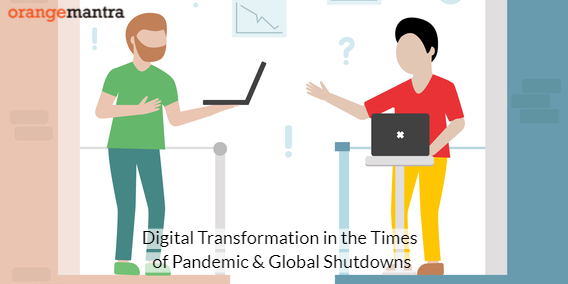The world continues to reel under COVID19. As economies plan to reopen, public health remains the biggest concern globally. Digital transformation, and many related tech trends, has seen a new boom amid these uncertain times. Businesses and organizations worldwide are looking at digital technologies to get through this crisis. The fundamental characteristics of digital platforms are proving to be crucial in the global fight against the novel coronavirus that causes COVID19.
The Rising Popularity of Digital Transformation
With the coronavirus pandemic becoming more widespread, digital transformation everybody’s mind in the commercial landscape. Before the pandemic, digital transformation meant different things to different people. But as the virus started shutting down economies, disruption virtually every kind of business, digitization becomes a survival tool for many. Business continuity became the most dominant functionality of digital transformation.
As of this writing, no effective vaccine is in sight anywhere in the coming months. Most experts believe that a safe vaccine would take at least 12-18 months. The direct implication of this for businesses is that they need to prepare for a long haul. Many of them are already doing. Businesses are using tech solutions more than ever. The use of online ERP solutions, for instance, has increased dramatically over the past few weeks. This trend of adopting digital solutions will only grow over the coming weeks and months.
Digitization as a Means of Business Resilience
Enhancing business resilience is more important than ever in these testing times. Companies are now adopting digital transformation strategies to improve their resilience in crises like this. Business resilience should be done in a way that helps the organization achieve its business objectives. Digital transformation helps businesses to reduce the likelihood of disruption and failure during unforeseen disasters like the coronavirus outbreak. This is a critical part of business continuity planning.
Increasing investments around the cloud and software-as-a-service (SaaS) helps businesses to scale up. Migrating your IT assets to the cloud and SaaS enables you to save costs and improve efficiency. Business process automation is another key area of digital transformation. Automation solutions like intelligent AI and chatbots, lets businesses augment capacity and boost resilience. Strategic use of AI, ML, and other automation technologies have the potential to create significant competitive advantage.
eCommerce and the Cloud for Business Continuity
One of the most demanding areas of business activities during this outbreak has been eCommerce. Online shopping has seen the highest demand since it emerged as a revolutionary technology in the industrial arena. Online retailers are trying to cope with the shifted operating model by leveraging various technologies. They are making sure that all safety guidelines are met while delivering goods. At the same time, traditional businesses are moving to the digital space.
Cloud-based eCommerce solutions are being increasingly used by businesses to continue operations amid lockdown orders. Businesses that didn’t have an eCommerce infrastructure are either building one or chalking out a strategy. eCommerce was growing steadily even before the pandemic. The outbreak has now prompted unprecedented growth in online shopping.
Work from Home as a Long-term Alternative
Lockdown orders and social distancing norms have forced organizations to adopt work from home. Many organizations were not prepared for work from the arrangement when the outbreak hit. Demands for various work from home solutions have since skyrocketed. More than ever, businesses need to collaborate with tech solution providers to build an efficient WFH infrastructure. Organizations should start with investing in devices and hardware for WFH. Then you need a software infrastructure and custom tools according to specific requirements of the organization.
Many companies will eventually go back to the traditional work-in-office arrangements as soon as the pandemic is over. However, a significant number of businesses and organizations are expected to continue with the WFH model, at least partially, even after the pandemic. Others will have a first-hand experience of how to deal with such situations in the future. Disaster preparedness of organizations has already improved many folds during this unprecedented virus outbreak.
Strengthening Business Data Analytics
Finally, data and insights will be powerful tools for navigating through the crisis. They will also help you to stay in the post-coronavirus market. As we all can now predict, the world of commerce will substantially change after the pandemic. Everyone is pondering about how the ‘new normal’ would like. That means, for many businesses this will an unknown territory.
Data analytics could help you to better understand the market after the pandemic. A growing number of businesses are already adopting data analytics solutions to prepare for the post-coronavirus market. Analytics is also key to a comprehensive digital transformation plan.
Conclusion
Digital transformation has helped businesses to become competitive and futuristic for several years now. But the pandemic has triggered a new kind of role for digital technologies. Businesses today are mainly embracing digitization as a way of business continuity and disaster management tools.
OrangeMantra has long vouched for the digital transformation of businesses. Being a globally trusted digital transformation provider, we approached the coronavirus disruption with increased responsibility. Since the beginning of the virus outbreak, we have helped many businesses and organizations to smoothly embrace digital transformation and sail through the crisis.
FAQs
Q. What is meant by digital transformation?
Digital transformation is the process of using digital technologies to create or modify a tech-based business infrastructure. Digital solutions enable companies to enhance the work culture, and customer experiences, and implement remote working, among other things.
Q. What does it mean to work remotely?
Remote work, or work from home, is a working style that allows professionals to work outside of a traditional office environment. Remote work arrangements are based on a tech-enabled infrastructure. OrangeMantra builds remote work solutions within the shortest development time possible.
Q. What is cloud ERP?
Cloud-based ERP is a type of enterprise resource planning (ERP) software that runs on a cloud computing platform, rather than on a business’s premises. Cloud or online ERP solutions offer great benefits in terms of cost and efficiency.






















